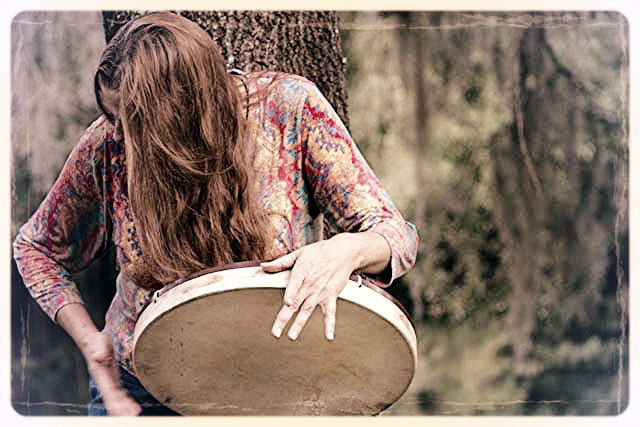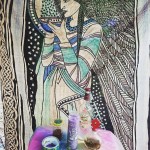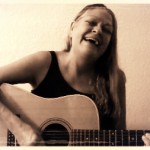 I got the bright idea to run around interviewing Pagan musicians about magic, music, and their spiritual practice at Caldera Fest and so far it has been every bit as awesome as I hoped it would be, despite some technical issues. Mama Gina is one of the twenty Pagan performers at the event, and also one of the contributors to the newly released Green Album. You can find out more about her at her website.
I got the bright idea to run around interviewing Pagan musicians about magic, music, and their spiritual practice at Caldera Fest and so far it has been every bit as awesome as I hoped it would be, despite some technical issues. Mama Gina is one of the twenty Pagan performers at the event, and also one of the contributors to the newly released Green Album. You can find out more about her at her website.
Mama Gina: I’m a Pagan bard. I’ve been on this very specific Pagan bard path for about four and a half years. I’ve been a musician all my life, grew up playing music, played professionally until I was about thirty-one, had a child, settled down, played part-time. That was all just Top Forty bands, country music, jazz bands, you name it. Then I went to PSG in 2008 or 2009 and I hadn’t been playing for a couple of years because my son was an early teenager. I had stopped playing music on the side and had a day job. We were getting ready to pack to go to Missouri and I said, “Do you think you can fold space and fit the guitar and drum? I haven’t touched them in a few years.” He did, and we made it out there and I started writing the music that kind of kicked off this whole bardic journey. Goddess kind of cracked me open that week and said, “It’s time for you to start writing again.” When I realized there was enough material to actually start playing for my friends around the campfire, Goddess said, “no no no, you’re going to do a little bit more than that,” and I stepped out on this bardic path, quit the day job about three years ago and haven’t looked back. I’ve been playing festivals, Pagan festivals, house concerts, all kinds of stuff, and having a blast doing it.
SA: It sounds like there definitely was some magic involved there.
MG: Big time. Music has always been magical to me. There’s no question, music has always been magical, even in the days when I was just playing straight up music, Top Forty even, I wanted to create an experience as a vocalist, I wanted to draw people in and make them feel something. That’s magic, when you can break down those barriers and create a space where people feel something, that’s just amazing. With the stuff I write now, I write about Gods and Goddesses and archetypes and raccoons that get into your stuff in the forest [laughs] and every kind of human and spiritual experience, it winds up in my music. I really try to tell stories in such a way that when people are sitting with me hearing these stories, they can really feel the moment. Some of my music is really…I’m really and truly an entertainer, so I want to make sure that my craft is good, but there’s a part of me that has nothing to do with my craft, my songwriting craft, and has everything to do with my connection to the divine. Being able to sit with someone in the space that we have created consensually and said, “this is where we are going to tell stories and transform,” I’ll hear somebody crying as I’m playing and I’ll feel good they felt something so deeply that they had to cry and they felt safe enough to do it in this space.
I don’t do it overtly the way some Pagan musicians do, and I love what they do, where they cast circle and then deconstruct it at the end…I don’t necessarily do that, but I do have a flow where I will invite people into that space. Today was “Binding Wood,” which is a Beltane chant that I wrote for a friend’s handfasting and which I used to invite people into that warm, summery place. Some things in my set may make them cry, may make them think very deeply, may make them angry. I like to end with lighthearted, funny, let’s get people laughing. It’s really an hour-long ritual of taking people through this cycle of emotions, but I really think that it’s part of my mission to remind people that they are light. You know, we do a whole lot of work shinying ourselves up and we have all this dark magic that we have to do to find all this broken stuff within ourselves and take it out and look at it. But I think there’s a point where you have to stop ripping that open and you have to smile and you have to laugh and you have to have this moment with each other in community. I think too often we are convinced that we have to learn through pain, but I like to remind people that we can learn through joy as well. So that’s kind of what I try to do by the end of my concert, is bring people back and do something silly and fun.
SA: So you spoke in terms of, I would say the technical aspects of the way you shape energy in the moment and so on. How does that tie into your personal spiritual path?
MG: That’s a really good question. My personal spiritual path looks like Billy’s trip to the mailbox…have you seen Family Circus? He wanders all over the place and then never actually gets to the mailbox…I’ve had people come up and say to me, even each song is like a mini-ritual, it opens up, it goes where it needs to go, and then I bring it back home so it closes up what it needs to. I’m a solitary, so when I create ritual space for myself I want it to be safe and comforting, unless I’m working on something really crazy but at my age I want safe and comforting most of the time. I want things to feel very secure, so I can get my work done. I like to leave personally on an upbeat feeling, to say, let’s bring some hope back into the world, let’s breathe this light back into the world, whatever work that I’ve done. That’s also what I do on stage, is try to create this space where people can feel very deeply. And they do, even non-Pagan crowds will come up to me afterwards and say, “That song made me sad, that song made me angry.” And I say, “Thank you very much, because that’s what I wanted to do, was to make you feel. Now, we can talk about it if you want,” you know?
Up next: Interview with Mama Gina, Part 2: Kaballah, creativity, and risks














